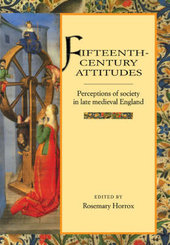
|
Fifteenth-Century Attitudes: Perceptions of Society in Late Medieval England
Paperback / softback
Main Details
| Title |
Fifteenth-Century Attitudes: Perceptions of Society in Late Medieval England
|
| Authors and Contributors |
Edited by Rosemary Horrox
|
| Physical Properties |
| Format:Paperback / softback | | Pages:260 | | Dimensions(mm): Height 244,Width 170 |
|
| Category/Genre | British and Irish History
World history - c 500 to C 1500 |
|---|
| ISBN/Barcode |
9780521589864
|
| Classifications | Dewey:942.04 |
|---|
| Audience | | Professional & Vocational | |
|---|
| Illustrations |
30 Halftones, unspecified
|
|
Publishing Details |
| Publisher |
Cambridge University Press
|
| Imprint |
Cambridge University Press
|
| Publication Date |
13 February 1997 |
| Publication Country |
United Kingdom
|
Description
This collection of essays takes a fresh and invigorating look at late-medieval English society by focusing not on how people lived but on how they saw the world and their place in it. Alongside contributions on how different social groups saw themselves and were seen by others are more general discussions of key aspects of fifteenth-century life: attitudes to the rule of law, to the power of the ruler, to education, to honour and service, and finally to death.
Reviews'... deserves a place on every library shelf ... it is consistently brief, clear, jargon-free and hence accessible both to the general reader and to the specialist ... All contributors ... parade an impressive and sometimes staggering range, which cumulatively give the book a freshness, originality and unexpectedness that is very inviting.' The Ricardian 'In this collective effort to 'get inside the skin' of fifteenth-century attitudes, Rosemary Horrox and her collaborators have demonstrated, superbly, how worthwhile an objective empathy can prove under the discipline of scholarship.' Maurice Keen, The Journal of Ecclesiastical History '... Rosemary Horrox and her collaborators have demonstrated, superbly, how worthwhile an objective empathy can prove under the discipline of scholarship.' Maurice Keen, The Journal of Ecclesiastical History
|